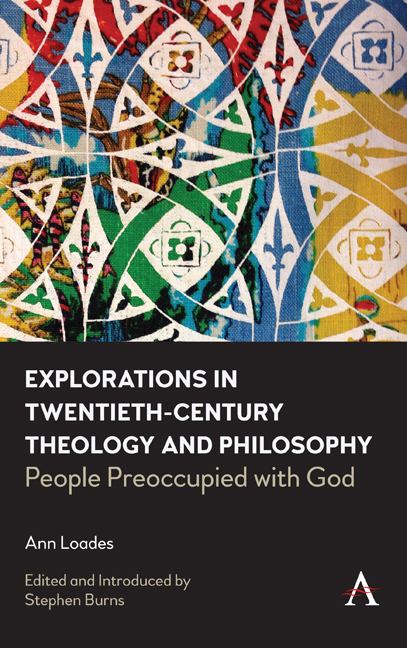Book contents
- Frontmatter
- Contents
- A Personal Note
- Foreword
- Introduction: The Grace of Intelligence
- Chapter One Evelyn Underhill (1875–1941): Mysticism and Worship
- Chapter Two Evelyn Underhill: As Novelist – Exploring Mysticism
- Chapter Three Dorothy L. Sayers (1893–1957): War and Redemption
- Chapter Four Dorothy L. Sayers: Are Women Human? Considering Dante’s Beatrice
- Chapter Five C. S. Lewis (1898–1963): On Gender
- Chapter Six C. S. Lewis: On Grief
- Chapter Seven Austin Farrer (1905–1968): Love Almighty and Ills Unlimited
- Chapter Eight Austin Farrer: And Friends
- Chapter Nine Simone Weil (1909–1943): Resistance and Writing
- Chapter Ten Simone Weil: Eucharistic Sacrifice – Exploring a Metaphor
- Chapter Eleven Stephen Sykes (1939–2014) and Colleagues: Exploring the Problematic Legacy of Power
- Afterword: The Passionate Intellect of Ann Loades
- Acknowledgements
- Bibliography
- Contributors
- Index
Chapter Seven - Austin Farrer (1905–1968): Love Almighty and Ills Unlimited
Published online by Cambridge University Press: 18 November 2023
- Frontmatter
- Contents
- A Personal Note
- Foreword
- Introduction: The Grace of Intelligence
- Chapter One Evelyn Underhill (1875–1941): Mysticism and Worship
- Chapter Two Evelyn Underhill: As Novelist – Exploring Mysticism
- Chapter Three Dorothy L. Sayers (1893–1957): War and Redemption
- Chapter Four Dorothy L. Sayers: Are Women Human? Considering Dante’s Beatrice
- Chapter Five C. S. Lewis (1898–1963): On Gender
- Chapter Six C. S. Lewis: On Grief
- Chapter Seven Austin Farrer (1905–1968): Love Almighty and Ills Unlimited
- Chapter Eight Austin Farrer: And Friends
- Chapter Nine Simone Weil (1909–1943): Resistance and Writing
- Chapter Ten Simone Weil: Eucharistic Sacrifice – Exploring a Metaphor
- Chapter Eleven Stephen Sykes (1939–2014) and Colleagues: Exploring the Problematic Legacy of Power
- Afterword: The Passionate Intellect of Ann Loades
- Acknowledgements
- Bibliography
- Contributors
- Index
Summary
This chapter is about Austin Farrer as a preacher of the gospel of divine saving judgement; for this purpose the Farrer of the sermons, the Lent books, the paragraphs for use at the Eucharist; even the Farrer who taught the use of the rosary. The thread of the chapter is provided by some of Farrer's remarks in Love Almighty and Ills Unlimited (1962; hereafter LA). The title reminds us of P. T. Forsyth's exposition of divine love as that which ‘has absolute power to give itself eternal and righteous effect’. Behind Forsyth lies a long tradition of discussion of theodicy, notably the challenge to Christian theology thrown down by Bayle at the end of the seventeenth century, and Leibniz's attempt to console those who like Bayle expressed inconsolable grief at the way in which ‘evil’ is woven into the entire cosmic texture. Farrer seemed to summarise this tradition when he wrote: ‘The very intensity of the indignation or grief which we feel over the affliction or destruction of God's creatures is a testimony to the esteem in which we hold the happiness and the mere life of the creatures affected’. Farrer's masterly appreciation and criticism of Leibniz sprung both from his own brilliance as a philosopher, and from his thorough grasp of the Christian gospel.
How may we as it were provoke Farrer to speak to us, so that he is not merely the elegant philosopher and theologian of an earlier generation, but a living voice? Perhaps we can deepen our sympathies and refresh our sensitivities to those features of Christ's passion reflected in Farrer's presentation of the gospel by paying attention to two profoundly moving modern ‘passion stories’. One is Rosemary and Victor Zorza's account of the death of Jane, their 25-year-old daughter, a situation of extreme physical evil, in which moral evil is not allowed to proliferate, despite Jane's death. Another is Rolf Hochhuth's account of a German love story, which ends in utter tragedy. Neither of these stories were written to further the interests of any religious apologetic, so it is by accident that they give us a sense of what might be meant by the claim that the passion of Christ is of universal significance.
- Type
- Chapter
- Information
- Explorations in Twentieth-Century Theology and PhilosophyPeople Preoccupied with God, pp. 89 - 104Publisher: Anthem PressPrint publication year: 2023



